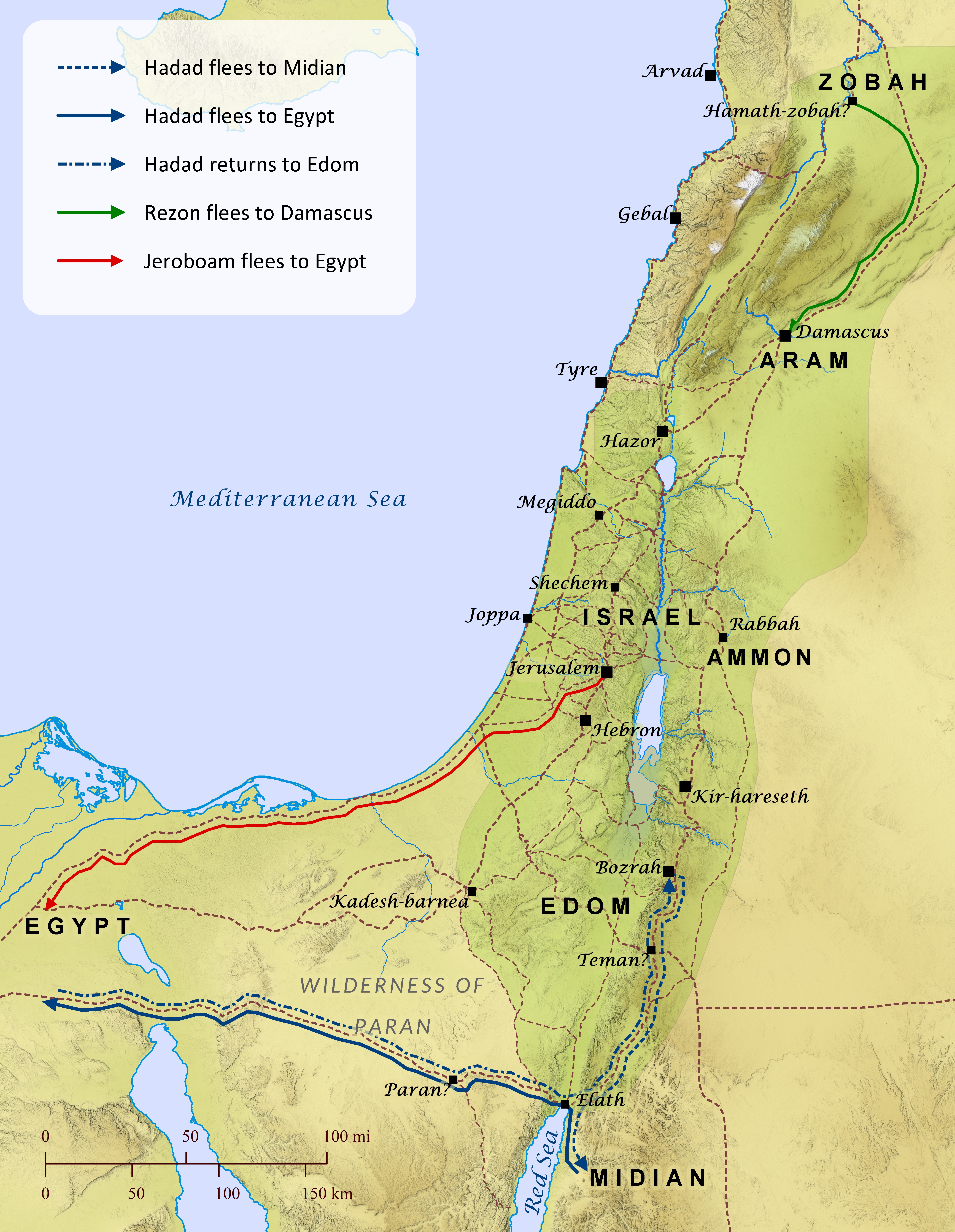Readers’ Version
Literal Version
11:14 Shelomoh’s enemies
14 Then Yahweh caused Hadad the Edomite (and a descendant of the Edomite king) to stand against Shelomoh. 15 In the past when David had been in Edom with his army commander Yoav to bury their dead, they had killed every male in Edom. 16 (Yoav and the Israeli warriors had had to stay there for six months to kill the Edomite males.) 17 However, Hadad had been a small child at that time, and he’d fled to Egypt with some of his father’s Edomite servants. 18 They’d passed through Midyan and then Paran where they’d gained some more men before entering Egypt where King Far-oh gave him a house and land, and provided him with food. 19 Far-oh took a liking to Hadad and gave him his wife Queen Tahpenes’ sister to marry. 20 Tahpenes’ sister gave birth to his son Genubath, his son, and Tahpenes weaned him in the midst of the house of Pharaoh. And Genubath was in the house of Pharaoh in the midst of the sons of Pharaoh.
21 When Hadad in Egypt heard that both David and his army commander Yoav had died, Hadad said to Pharaoh, “Give me permission to leave, and I’ll go back to my land.”
22 But Far-oh asked him, “But what’s wrong with staying here? You’ve stunned me by asking to go to your land.”
“Nothing’s lacking here,” he replied, “but I have to go—please give me permission to leave.”
23 God also caused Elyada’s son Rezon to stand against Shelomoh. He’d run away from his master, King Hadadezer in Tsovah, 24 then he’d gathered men for himself and had become a commander of a raiding band. When David attacked them, they went to Dammesek (Damascus). They lived there and gained control of the city. 25 Then during all of Shelomoh’s reign, he’d been outspoken against Israel—encouraged by the evil that Hadad did. He reigned over Syria (Aram) and he loathed Yisrael.
15 And_he/it_was in/on/at/with_was Dāvid DOM ʼEdōm in/on/at/with_went_up Yōʼāⱱ/(Joab) the_commander_of the_army to_bury DOM the_dead and_struck_down every_of male in/on/at/with_ʼEdōm.
16 If/because six_of months he_remained there Yōʼāⱱ and_all Yisrāʼēl/(Israel) until he_had_cut_off every_of male in/on/at/with_ʼEdōm.
17 And_ Hₐdad _fled he and_certain ʼEdōmite from_servants_of his/its_father with_him/it to_ Miʦrayim/(Egypt) _go and_Hₐdad was_a_youth young.
18 And_set_out from_Midyān and_they_came Pāʼrān and_they_took men with_them from_Pāʼrān and_they_came Miʦrayim to Parˊoh the_king_of Miʦrayim and_gave to_him/it a_house and_food he_assigned to_him/it and_land he_gave to_him/it.
19 And_ Hₐdad _found favour in/on_both_eyes_of Parˊoh exceedingly and_gave to_him/it a_wife DOM the_sister_of his/its_wife/woman the_sister_of Taḩpənēyş the_queen.
20 And_she/it_gave_birth to_him/it the_sister_of Taḩpənēyş DOM Gənūⱱat his/its_son and_weaned_whom Taḩpənēyş in_the_middle of_the_household_of of_Parˊoh and_he/it_was Gənūⱱat the_house_of Parˊoh in_the_middle the_sons_of Parˊoh.
21 And_Hₐdad he_heard in/on/at/with_Miʦrayim if/because_that he_had_lain_down Dāvid with fathers_of_his and_because/when he_had_died Yōʼāⱱ/(Joab) the_commander_of the_army and_ Hₐdad _he/it_said to Parˊoh send_away_me and_go to country_of_my_own.
22 And_he/it_said to_him/it Parˊoh if/because_that what are_you lacking with_me and_now_you are_seeking to_go to country_of_your_own and_he/it_said no if/because really_(let_go) go_me.
23 And_ god _raised_up to_him/it an_adversary DOM Rəzōn the_son_of ʼElyādāˊ who he_had_fled from Hₐdadezer the_king_of Tsōⱱāh/(Zobah) master_of_his.
24 And_gathered on/upon/above_him/it men and_he/it_was the_leader_of a_marauding_band in/on/at/with_killed Dāvid DOM_them and_went Dammeseq and_they_lived in/on/at/with_her and_reigned in/on/at/with_Dammeseq.
25 And_he/it_was an_adversary of_Yisrāʼēl/(Israel) all_of the_days_of Shəlomoh/(Solomon) and_DOM the_trouble which Hₐdad and_loathed in/on/at/with_Yisrāʼēl/(Israel) and_reigned over ʼArām.

